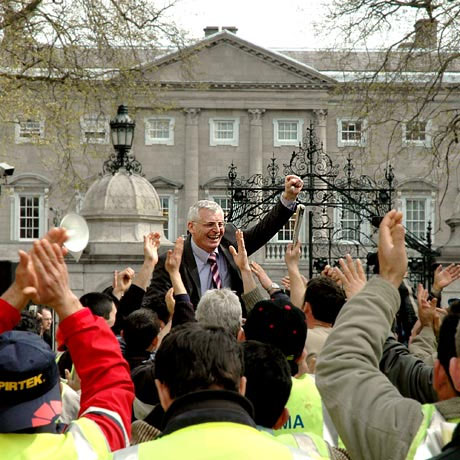
Socialist Party support increasing amongst working class
The imminent general election in the Irish Republic (on 25 February) was called because the dominant coalition party in the recent government – Fianna Fáil – collapsed out of office in utter disarray. Fourteen years of its rule in the interests of major developers and bankers has bankrupted Ireland, causing mass unemployment, drastic reductions in take home pay, and forcing tens of thousands of young people to emigrate.
Only three and a half years ago, Fianna Fáil won just under 42% of the vote but now they are hovering around 16%. Their coalition ‘mudguard’ – the Greens – are floating anywhere from 3% to 1% in the polls.
The Socialist Party has nine of the 20 United Left Alliance (ULA) candidates, standing in nearly half the constituencies throughout the country. Pundits are predicting that the Socialist Party-initiated ULA could win four or five seats.
The Socialist Party is particularly challenging for seats in Dublin North with councillor, Clare Daly, Cork North Central with councillor Mick Barry and in Dublin West with Joe Higgins MEP.
An Irish Times poll regarding Cork North Central, published on 14 February, illustrated the tremendous growth in support for Mick Barry to 13%, over 9% up on his 4% in 2007.
Bankruptcy
The strongest feature in the election is the public’s hatred of Fianna Fáil and the shock at the state of the country. Paradoxically, so established is it that Fianna Fáil has already lost the election that on a few occasions their new leader, Micheal Martin, has been able to pose as the ‘opposition’ in the campaign! But to no avail, in terms of public support however.
The latest opinion poll on 13 February even suggested that the main pro-capitalist opposition party, Fine Gael could get an overall majority, which no party has had since 1977, or could rule soon the basis of the support of right-wing independent TDs (members of the Irish parliament).
The poll results showed Fine Gael on 38% (up three percentage points), Labour 20% (down two), Fianna Fáil 15% (down two), Sinn Féin 10% (down three), Greens 3% (up one) and Other/Independents 14% (up three).
The election has understandably been dominated by the economy and related issues.
The first two weeks of the campaign saw the media attack the idea that the debts should not be paid, arguing a default would mean a gaping budget deficit and immediate financial collapse, as the EU/IMF and the money markets would refuse Ireland credit. Clearly, the establishment is fearful of the public anger that exists toward the bankers, speculators and ruling elite.
The reality is that bankruptcy is guaranteed on the basis of the EU/IMF austerity deal struck with the last Fianna Fáil-led coalition government. It will suck €16 billion out of the economy, making the crisis and indebtedness worse. This year, €4.8 billion was paid in interest alone, by 2014 it will be €10 billion or more than 20% of total state revenue!
Employment has been lost in the media debate but is the biggest issue in the election. None of the establishment parties have any policy or plan on job creation; they are simply waiting and hoping for the capitalist market and private investment to recover. This will not be anytime soon, as investment collapsed last year by 31%. Only democratic public ownership of wealth and socialist planning of the economy can offer a way forward.
However, there are fears about the economy and a sovereign debt default, reflected in the doorstep canvassing, with many people agreeing with the Socialist Party’s analysis but hesitant about committing their support. The slight drop off in support for the nationalist Sinn Féin in recent opinion polls probably reflects these fears.
Outcomes
Labour has been stalled in the polls since last November, when it became clear they were prepared to accept the parameters and constraints of the four-year IMF/EU deal. However, it is possible that they could rise again now as people, fearful about the economy and the possibility of Fine Gael ruling alone, may feel Labour in power could alleviate some of the worst effects of the crisis.
The United Left Alliance has been a very timely initiative and is seen as a very important development by left-leaning workers and youth. The conditions have been difficult for it to develop a broader momentum at this point but success in electing a number of TDs could open up explosive potential in the months and years ahead.
The election has not been easy but at base there is huge anger about the crisis and the austerity cuts and we are confident that will be shown on election day.
The increase in support for the Socialist Party in Cork North Central is a bigger increase than either Sinn Féin or Labour achieved. The Irish Times poll means Mick Barry has a chance of winning a seat and we are pitted now in an intense battle with a Fianna Fáil minister in that constituency. Here and in the other areas, the Socialist Party will go all-out to try and achieve a decisive breakthrough on 25 February.

Be the first to comment